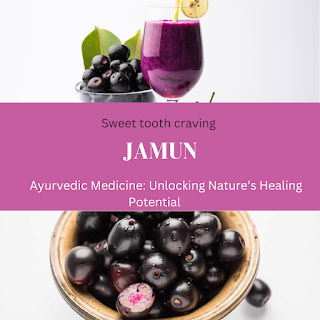Jamun Ayurvedic medicine: unblocking nature's healing potential
Jamun Ayurvedic medicine: unblocking nature's healing potential
Jamun, scientifically known as Syzygium cumini, holds a significant place in Ayurveda, the traditional system of medicine in India. Renowned for its myriad health benefits, Jamun is often referred to as a powerful natural remedy for various ailments. According to Ayurvedic principles, Jamun is classified as a cooling and astringent fruit that balances the Kapha and Pitta doshas.
It is highly valued for its ability to control blood sugar levels, making it a staple in the management of diabetes. The fruit's seeds are particularly noted for their hypoglycemic properties.In addition to its role in managing diabetes, Jamun is also known for its digestive benefits. It aids in alleviating diarrhea and dysentery due to its astringent properties, which help to tighten the tissues and reduce excessive fluid secretion. The fruit is rich in antioxidants, which protect the body against oxidative stress and inflammation. Furthermore, Jamun supports cardiovascular health by improving blood circulation and reducing the risk of hypertension.
Ayurveda also recognizes the importance of Jamun in enhancing skin health. The fruit's astringent nature helps in treating acne and other skin conditions by reducing excess oil and tightening pores. Moreover, the high vitamin C content in Jamun boosts immunity and promotes overall well-being. The leaves, bark, and seeds of the Jamun tree are used in various Ayurvedic formulations to address issues ranging from dental problems to respiratory disorders.
 medicinal qualities
medicinal qualities
Rasa (taste)- kashaya ( astringent) , madhura (sweet), ambla ( sour)
Guna (quqlities)- laghu ( light to digest) rooksha (dry)
Vipaka( taste conversion after digestion)- katu (pungent)
Veerya (potency)- sheeta(cold)
Effect on tridosha- it increases Vata but balances Kapha and Pitta.
Part used dose
part used : fruit, seed ,leaf, stem bark.
dose:
fresh juice- 10 -20 ml
powder- 3-6 gm
Medicinal usage
Internally
Fruit- fruit has carminative, digestive, liver stimulant and styptic properties. fruit is indicated in loss of appetite, indigestion ,abdominal colic, malabsorption syndrome.
leaves- leaves are effective to cure vomiting . Tender leaves are useful in Vamana Panchkarma procedure
Bark- bark has a styptic property, over consumption of fruit can cause abdominal distension.
Circulatory system
styptic ,indicated in menorrhagia, bleeding per rectum. Where the bleeding or extra flow needs to be stop.
Excretory system
Decreases urine production, indicated in Madhumeha and Udakameha.
main usages of jamun- Diabetes, wound healimg ,diarrhea, menorrhagia.






Comments
Post a Comment